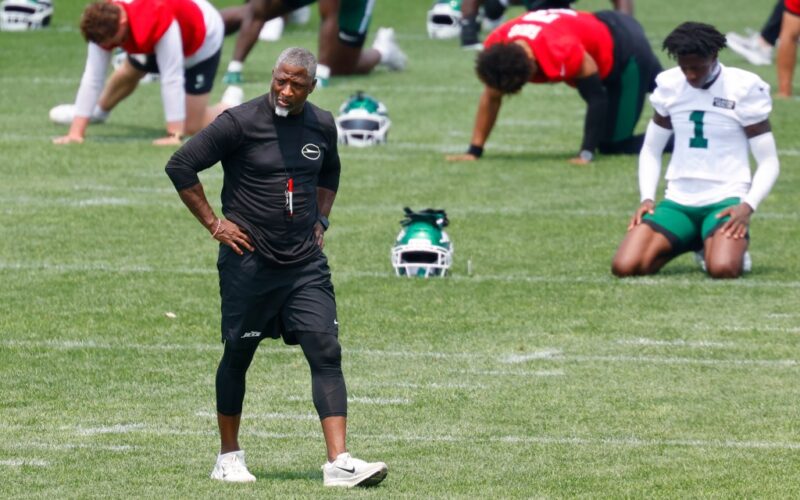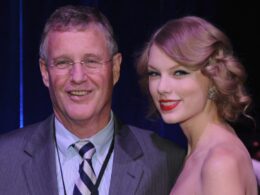It is about that time for players to report for training camp.
Jets rookies will report to training camp on July 19. The veteran will report on July 22 and the team will hold their first practice the next day.
Following a disappointing 5-12 season, the Jets’ roster looks completely different from a year ago, when they had Super Bowl aspirations. There’s also a new general manager (Darren Mougey) and coach (Aaron Glenn), who have already begun changing the Jets’ culture.
When he was hired by the Jets in January, Glenn was labeled a culture builder after helping the Lions go from NFL bottom feeders to contenders in four seasons. He is hoping to do the same with a Jets franchise that hasn’t made the playoffs since 2010.
Let’s take a look at some of the top storylines to watch:
CAN FIELDS FINALLY LIVE UP TO HIS POTENTIAL?
The Jets signed Justin Fields to a two-year, $40 million contract in March, hoping he can revitalize his career. We have seen other quarterbacks, such as Baker Mayfield, Geno Smith, and Sam Darnold, who have experienced resurrections later in their careers, and Fields is hoping to be next up.
Fields, 26, is coming off a season in which he recorded the highest completion percentage (65.8%) in his lone season with the Steelers. However, that was in a small sample size after starting just six games before Russell Wilson returned from a calf injury.
Since he was drafted 11th overall by the Bears in the 2021 NFL Draft, Fields’ career has been uneven as a passer. He has thrown for 7,780 yards, 45 touchdowns, and 31 interceptions in 50 career games.
Glenn’s mission when the Jets signed Fields was to make him an all-around quarterback, not just an athlete who plays the position. First-year offensive coordinator Tanner Engstrand, who was the Lions’ passing game coordinator for three seasons, will be responsible for helping Fields reach that untapped potential.
During practices in the spring, Fields continued to improve as he learned Engstrand’s offense, which will resemble the Lions’ system. A lot of pressure is on Fields this season. If he does not live up to the expectations the Jets have for him, they could release him next offseason and save $10 million with a June 1 designation.
That would also likely mean the Jets will be in the market for a quarterback in next year’s draft.
WHO WILL STEP UP AS THE JETS’ WR2?
Garrett Wilson could be poised to have the best season of his career. Fields and Wilson have chemistry dating back to their time together at Ohio State, where they were teammates for two seasons (2019-20).
But who will be the Jets’ second receiving option opposite Wilson?
Josh Reynolds, whom the Jets signed to a $2.75 million contract in the spring, appears to be the early leader in the clubhouse. He has caught just 13 passes for 194 yards and a touchdown during his time with the Broncos and Jaguars last season.
Reynolds, 30, was released by the Broncos last December and claimed by the Jaguars, who cut him in March.
During training camp, Reynolds will face competition from Allen Lazard, Tyler Johnson, Xavier Gipson, fourth-round rookie Arian Smith, and former third-round pick Malachi Corley.
The Jets also drafted tight end Mason Taylor, who was a reliable target during OTAs (organized team activities) and mandatory minicamp.
WILL DEFENSE CONTINUE TO PLAY AT TOP LEVEL?
Shortly after he was hired in January, Glenn hired Steve Wilks to oversee a Jets defense that has finished in the top five in yards allowed each of the last three seasons.
With a new system in place, will the unit continue to play at a high level? Wilks takes over a Jets defense that returns eight starters from a team that finished third in yards allowed (313.8).
But that number was an optical illusion following Robert Saleh’s firing after Week 5. In their final 12 games, the Jets were 28th in points (26.6) and 18th in yards allowed per game (337.9).
Wilks is known for his aggressive and physical brand of defense, characterized by a high number of blitzes and zone coverages. When Glenn was the defensive coordinator of the Lions, he preferred to use a lot of man-to-man coverage.
The Jets’ defensive system is expected to be a blend of both Wilks’ and Glenn’s styles.
WILL GARDNER & WILSON RECEIVE EXTENSIONS?
The Jets hit a grand slam with their 2022 draft class of Wilson and Sauce Gardner, who both won the NFL Offensive and Defensive Rookie of the Year Awards, respectively. Now it’s time to pay the piper or, in this case, extend them.
Luckily for the Jets, they have already exercised the fifth-year option for both players and they will be under contract until after the 2026 season. But they would love to lock up both players for the foreseeable future.
Ideally, it would be great to extend both players before the start of the regular season. The Jets did that last year when they signed cornerback Michael Carter II to a three-year, $30.75 million contract extension last September.
Gardner’s contract extension is probably the easiest of the two, considering Texans cornerback Derek Stingley Jr. received a three-year, $90 million deal during the offseason, which made him the highest-paid cornerback in NFL history. Gardner has been a two-time first-team All-Pro and Pro Bowl selection during his first three seasons, so he will likely receive slightly more than Stingley whenever the extension happens.
WHO HAS SOMETHING TO PROVE?
There are a few players on the Jets roster who have something to prove. Among them are Lazard, Corley, and running back Breece Hall.
Following Aaron Rodgers’ release and with the recent youth movement, many expected Lazard to be released. However, he took a significant pay cut to remain on the Jets roster. Lazard will have a base salary of $2.25 million this upcoming season.
In addition, the Jets guaranteed $1.75 million of Lazard’s base pay and voided the final year of his contract. That will allow Lazard to become a free agent next offseason.
In two seasons, Lazard has struggled after compiling 60 catches, 841 yards, and seven touchdowns after signing a four-year, $44 million contract in 2023. He was benched during his first season with the Jets after catching just 23 passes for 311 yards and one touchdown in 14 games.
Like Lazard, Hall is also in the final year of his contract. In most of his tenure with the Jets, Hall has been the No. 1 running back.
Although that is still expected to be the case with Engstrand now overseeing the offense, the Jets will employ a running back by committee system with second-year players Braelon Allen and Isaiah Davis.
While Lazard and Hall will likely both make the team, there’s no guarantee for Corley, who missed substantial time in the spring due to an undisclosed injury. Engstrand told reporters last month that Corley will “have to find a way to catch himself up.”
This Jets regime did not draft Corley, and there’s no guarantee he will make the final roster. Especially after his only notable play last season was an embarrassing ball drop/fumble inside the one-yard line against the Texans, which resulted in a touchback.








